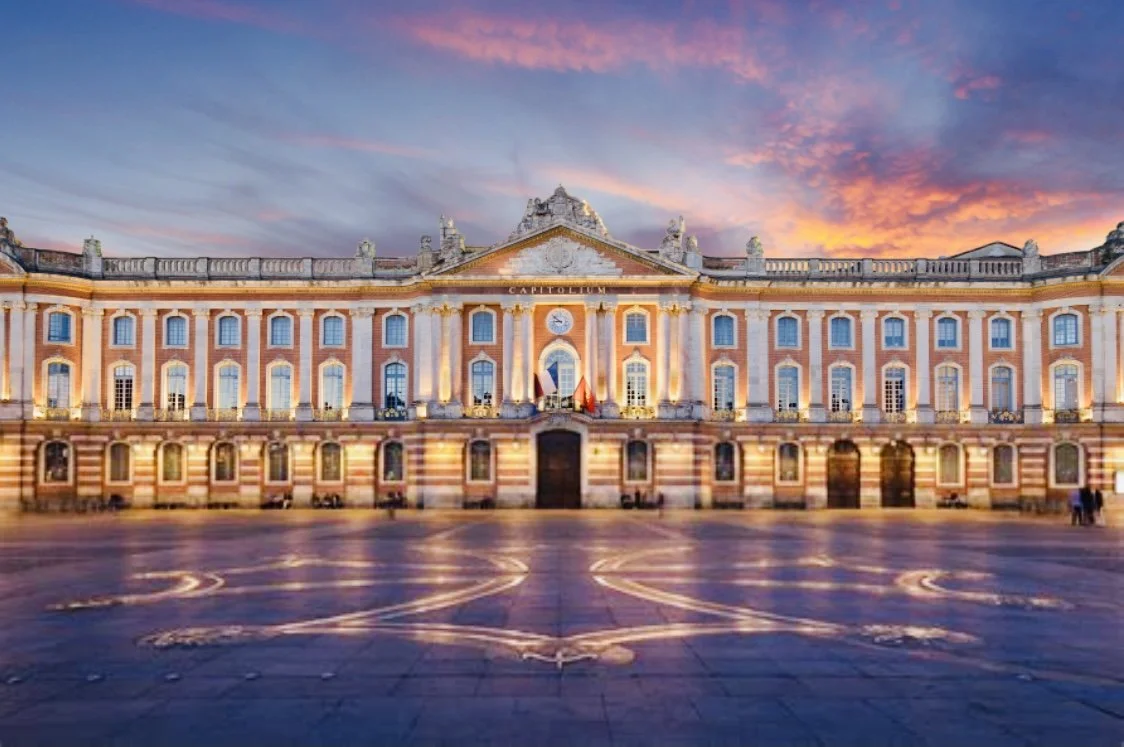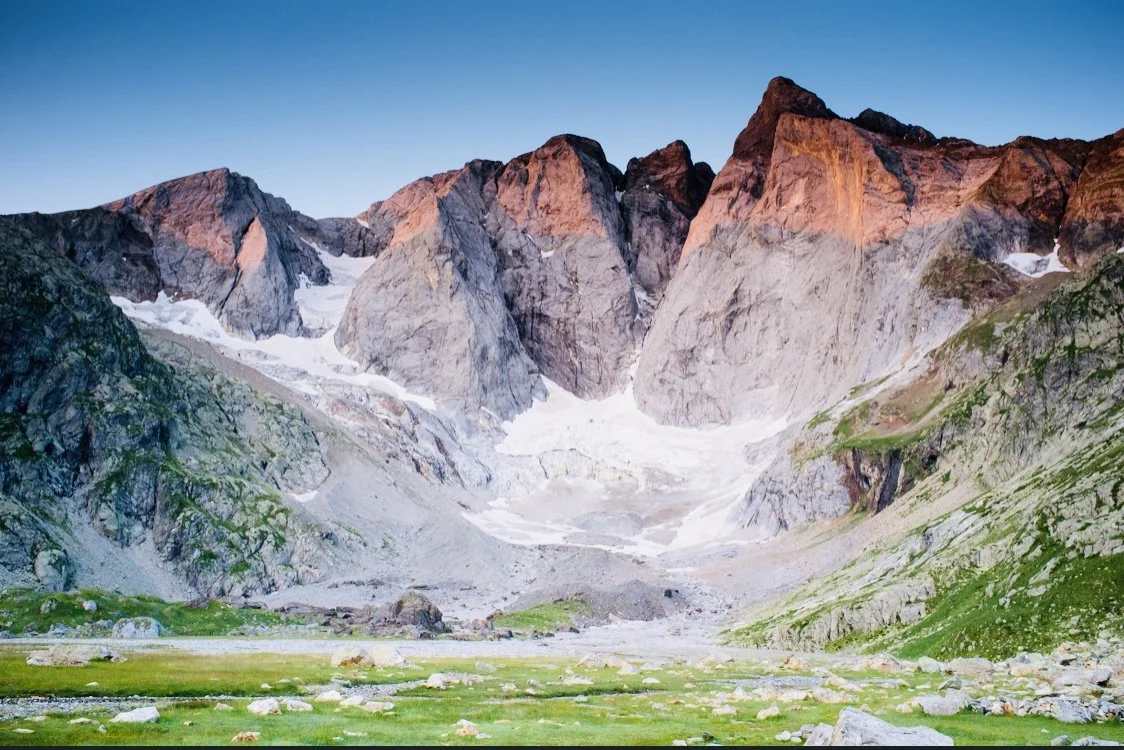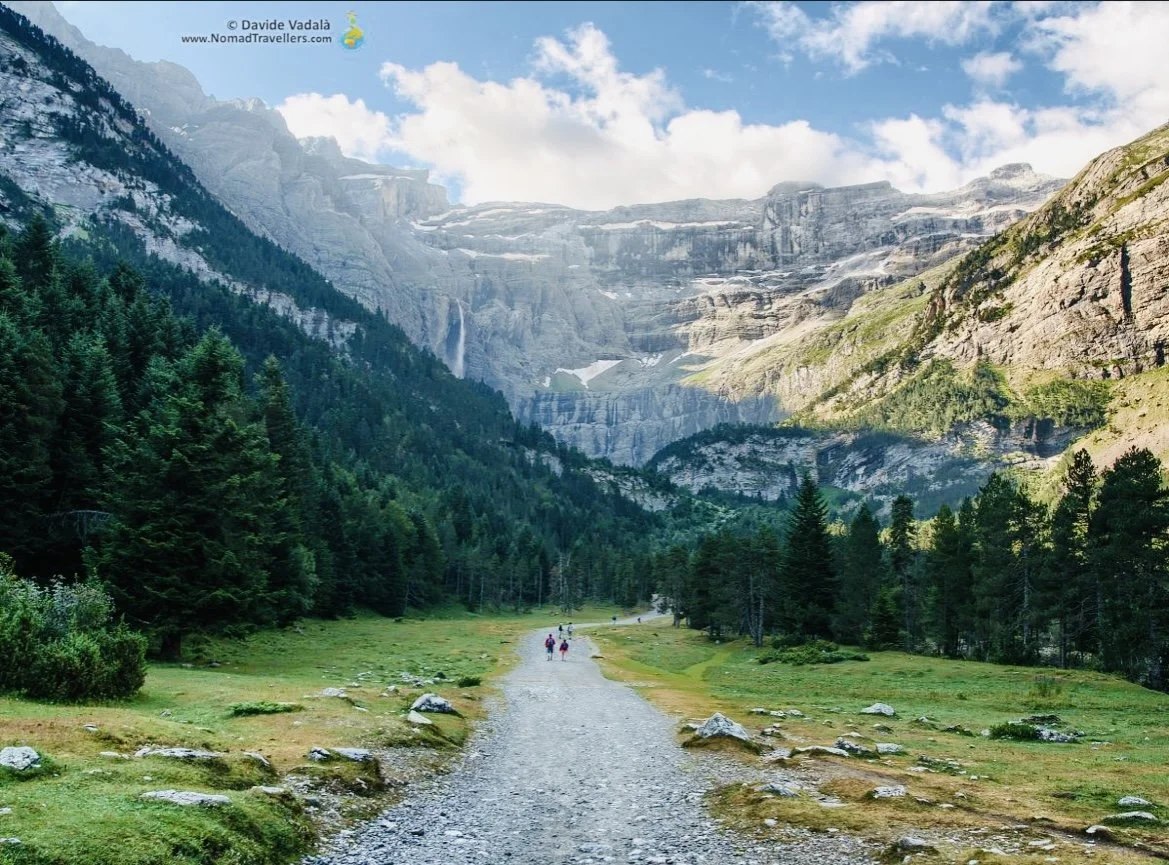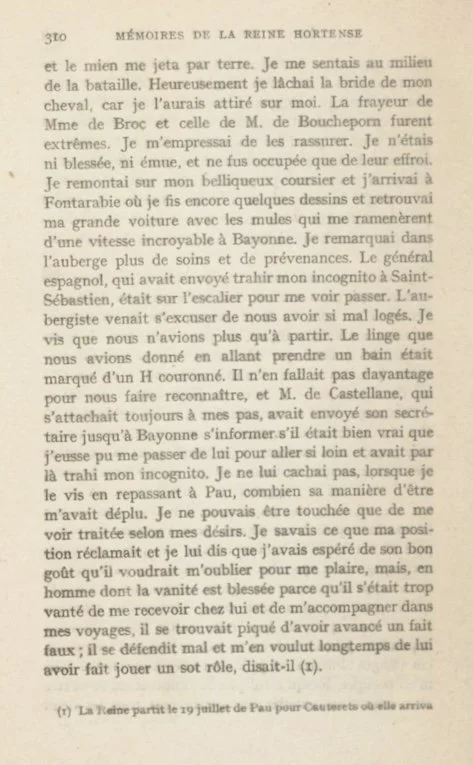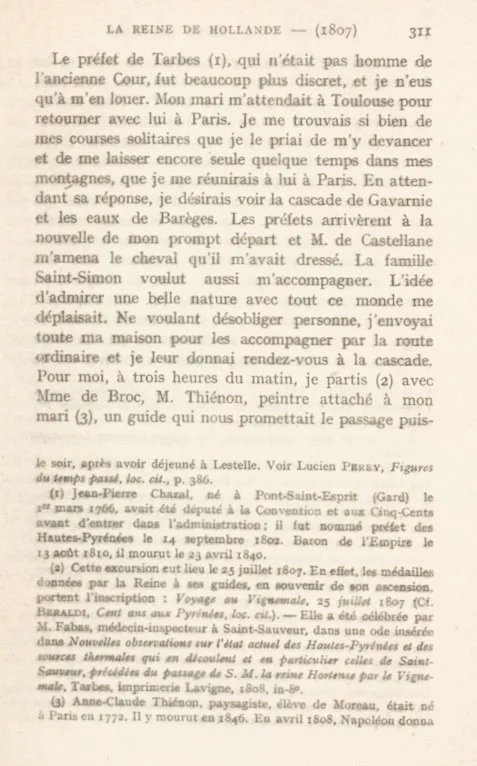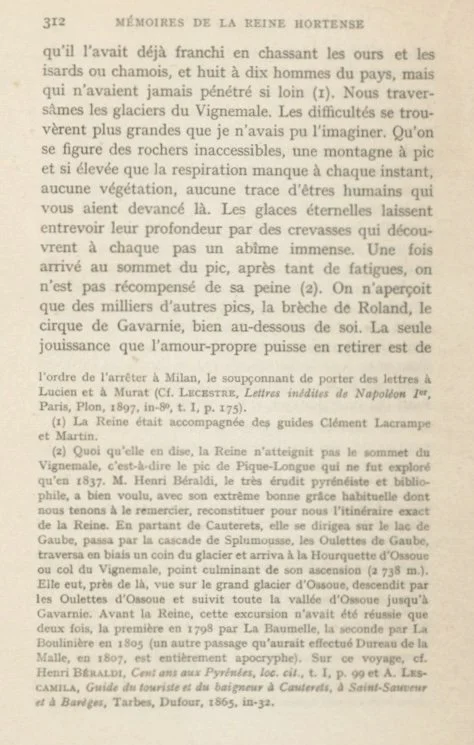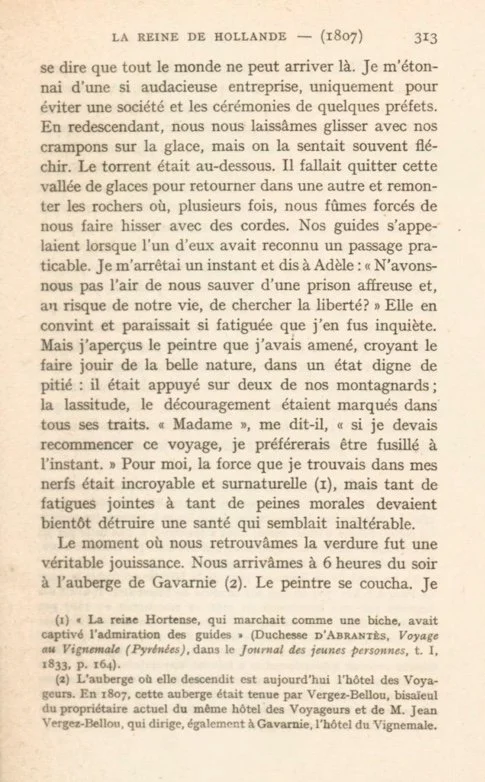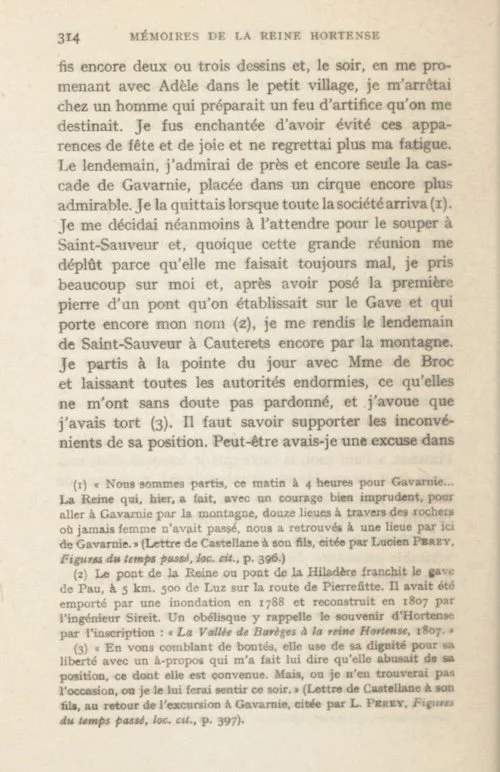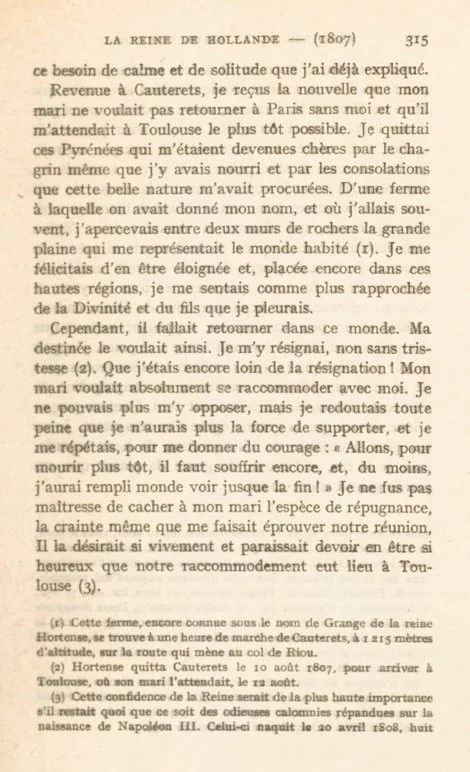Let’s have another look at Hortense’s Memoirs. If you want to read the book it is available for free at the side bar in English and French. Use the widget on the sidebar to translate the text below into pretty much any language.
Hortense deals with being obligated by a bunch of people who make demands on her time. She holds out as long as she can but then finally feels she must return to her abusive marriage which she figures will hasten her death.
Hortense’s memoirs continues:
I saw there was nothing to be done but to leave. The linen we had left behind when going to take a bath was marked with an H and a crown. This in itself was enough to disclose our secret. Monsieur de Castellane, who continued to dog our footsteps, had sent his secretary as far as Bayonne to find out whether it were possible that I could continue to get along without his services. In this way he had betrayed my identity. When I returned by way of Pau, I made it plain to the prefet how greatly his behavior had displeased me. I was aware of the honors due my rank, but, as I told him, I had hoped he would have sufficient good taste to overlook them in accordance with my wishes.
However, on account of his vanity and the fact that he had boasted so much about receiving me at his house and accompanying me wherever I went, he was vexed at having been put in the wrong. He tried awkwardly to excuse himself but continued to dislike me for, as he put it, having placed him in an awkward position.
The prefet of Tarbes, who had not attended the former royal court as Monsieur de Castellane had done, was far more discreet and I was thoroughly satisfied with the way in which he treated me. My husband was waiting for me at Toulouse to take me back with him to Paris. I was enjoying my informal excursion so much that I asked him to go on ahead and allow me to remain a little while longer in my dear mountains. I would meet him again in Paris. While waiting for his reply I wished to visit the waterfall at Gavarnie and the springs at Bareges.
Hearing I was about to leave, the two prefets appeared. Monsieur de Castellane brought me the horse he had had specially trained for my use. The Saint-Simon family also wished to accompany me. I did not like the idea of admiring the beauties of nature surrounded by all these people. Not wishing to offend anyone I sent all my household to accompany them along the usual road and promised to meet them at the waterfall.
I myself left at three o'clock in the morning with Madame de Broc, Monsieur Thienon, a painter attached to my husband's household, a guide who declared he could show us the way over the pass as he had crossed it when hunting bear, izard or chamois, and eight or ten men who though born in the neighborhood had never yet made such a climb. We crossed the Vignemale glaciers. The difficulties proved greater than I had expected.
Imagine inaccessible rocks, a mountainside so precipitous as to take your breath away at every step. Nowhere was there the least sign of vegetation, nowhere an indication that a human foot had before trod the soil on which you were standing. Eternal masses of ice gleamed at the bottom of crevasses which yawned on every hand. After so much effort the view from the top of the peak is not worth one's labor. All one sees is thousands of other peaks, the Breche de Roland and the Cirque de Gavarnie far beneath you.
The only satisfaction to one's pride is the thought that not everyone could have made the climb. I was astonished at having undertaken so arduous a task simply to escape the companionship and conventional chatter of two prefets.
On our way down we slid along with our crampons over the ice, but felt it often crack under our weight. The torrent lay beneath us. It was necessary to leave this icy valley and return by way of another in which we were frequently obliged to employ ropes to pull ourselves up over the rocks. Our guides called to each other as soon as one of them had discovered a possible passageway.
I stopped a moment and said to Adele, "Does it not seem as though we were breaking out of some dreadful prison and escaping at the risk of our lives?" She agreed but appeared so exhausted that I felt alarmed. At the same time, I caught sight of the painter whom I had taken along, thinking he would enjoy the beauties of nature.
He was in a truly pitiable condition and obliged to lean for support on two of our mountaineers. Fatigue and discouragement were stamped on his countenance. "Madame," he said, "rather than undertake again this trip I should prefer to be shot on the spot." As for me, my nervous energy was simply incredible, but many worries physical and mental were in the near future to destroy a health which had seemed unalterable.
The moment we again caught sight of green vegetation was an instant of real rejoicing. We arrived at six o'clock in the evening at the inn at Gavarnie. The painter went to bed. I made two or three more sketches, and in the evening walked about in the little village, and stopped to watch a man who was preparing a display of fire-works to be held in my honor. I was delighted to have escaped these so-called "festivities," and my pleasure in having done so rewarded me for the fatigue I had undergone.
The following day I admired, still without any escort, the waterfall at Gavarnie, situated in the midst of an admirable natural amphitheater. I left the spot when the rest of the party arrived, but decided to wait for them before having supper at Saint-Sauveur. Although as usual the presence of a number of people made me feel unwell, I overcame my faintness. After laying the cornerstone of the bridge across the Gave which still bears my name, I went the next day from Saint-Sauveur again to Cauterets across the mountain. I left at day-break with Madame de Broc while all the officials were still asleep, a crime for which doubtless they never forgave me.
They were not altogether wrong. One should bear the inconvenience of one's station in life. But perhaps my need for quiet and solitude was a sufficient excuse for my conduct. On arriving at Cauterets I received word that my husband would not return to Paris without me and that he was expecting me at Toulouse as soon as possible. I left these Pyrenees, which I had come to love both on account of the sorrow I had suffered there and the solace that nature had offered me.
From a farm which had been named after me I caught a glimpse between two rocks of the vast plain, which represented to me the outer world. I congratulated myself on having been able to escape from it, and felt that in these high altitudes I had been able to come closer to God and to that child whose loss I mourned. Nevertheless, I was obliged to reenter that outer world. My fate would not allow me to do otherwise.
I accepted that fate, but not without regret. How little was I yet able to resign myself to what had to be! My husband insisted upon a reconciliation. I could no longer refuse, but I dreaded all the pain, which I lacked the strength to endure. As encouragement I kept repeating over and over to myself: "In order to die sooner I must suffer even more. At any rate I shall have performed my duties to the end."
The original French is available below:

